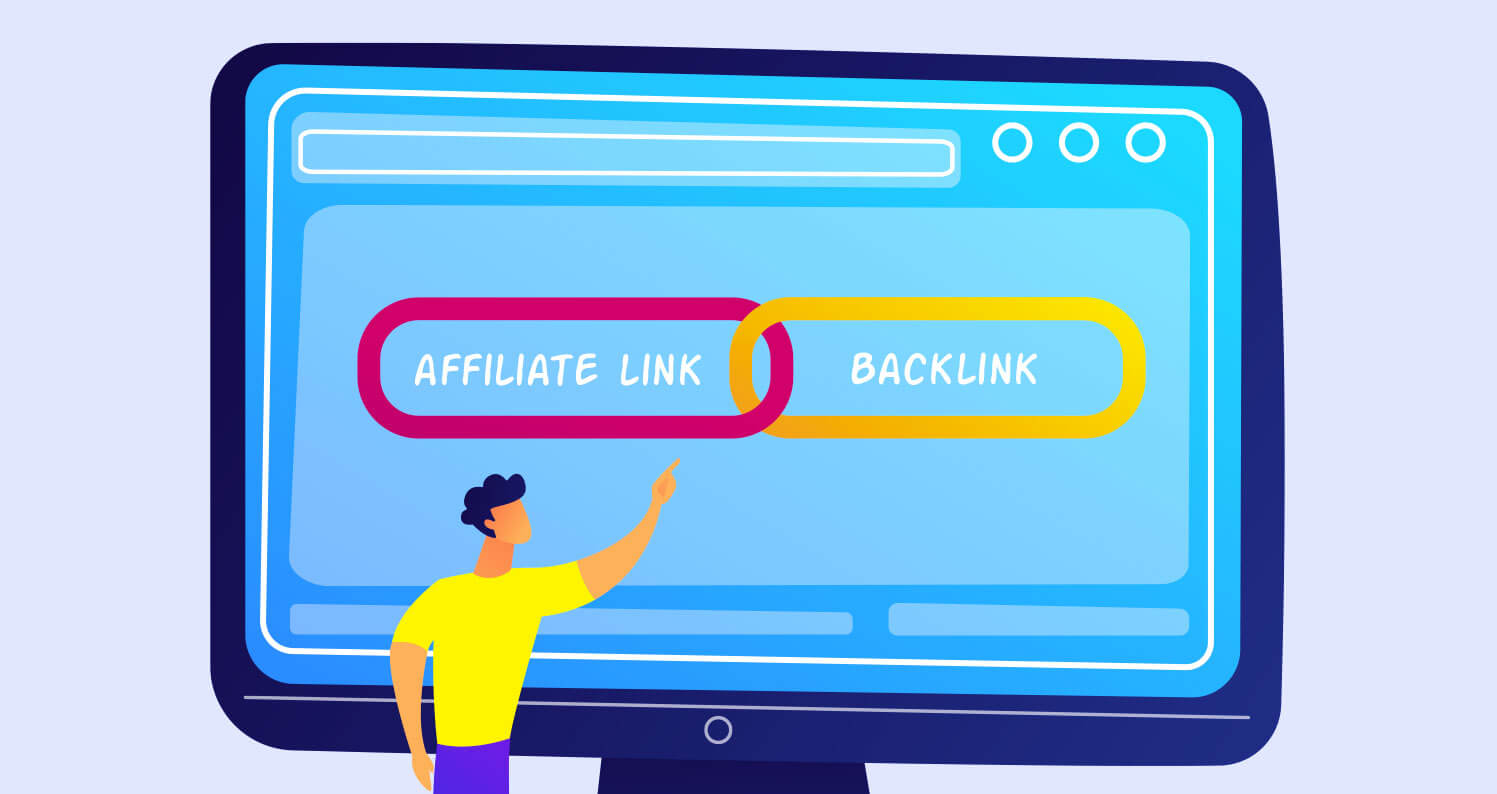Affiliate Links & SEO: A Complete Guide
What are affiliate links? How do they work? Do they help or hurt SEO? Get answers to these questions and more in this comprehensive guide.

Affiliate links are a powerful tool for monetizing websites and driving revenue. However, they also intersect closely with SEO strategies.
With search engine rankings, improper use of affiliate links can raise red flags with Google and other search engines. This can harm a site’s visibility.
Understanding the relationship between affiliate links and SEO is essential. Both brands and content creators need to keep their sites compliant if they want to maintain organic search presence.
Fortunately, adhering to best practices can help you leverage affiliate marketing without compromising your search engine optimization efforts.Naturally, the concerns brands have with affiliate links will tend to differ from those had by affiliates. To make this distinction clearer, this article calls out which sections apply to brands, affiliates, or both.
- What’s an affiliate link?
- How do affiliate links work?
- Why do backlinks matter for SEO?
- Do affiliate links help SEO?
- Can inbound affiliate links hurt a brand’s SEO?
- Can outbound affiliate links affect publisher rankings?
- How many affiliate links can go on a single webpage?
- What are some affiliate link best practices?
- Do affiliate links need to be tagged “sponsored”?
- When might affiliate links hurt SEO?
What’s an affiliate link?
Applies to: Brands & Affiliates
Affiliate links are URLs used when promoting goods and services on a website. Unlike natural organic links, affiliate links typically include tracking parameters. This gives a commission to the affiliate if a specific action occurs. Possible actions include making a purchase, completing a download, or filling out a lead form.
These types of links typically include an affiliate ID to associate the affiliate with a program. This makes it easier to track and assign commissions based on the actions taken by consumers.
How do affiliate links work?
Applies to: Brands & Affiliates
When a user clicks on an affiliate link, they are redirected to the merchant’s website. This is when the affiliate’s unique identifier is recorded.
If the user completes a desired action, the affiliate then earns a commission based on the terms of the program.
These links use tracking mechanisms like cookies or unique identifiers to attribute conversions to the affiliate. Cookies store data about the user’s activity. Commonly tracked activities include when users click the link and how long the tracking lasts (i.e., cookie duration).
Affiliate links credit affiliates for their role in driving sales or leads. The result is a performance-based marketing system beneficial to both partners and merchants.
Why do backlinks matter for SEO?
Applies to: Brands & Affiliates
Backlinks are links from external, third-party websites that point back to your own website. Beyond sending referral traffic to your site, they also send trust signals to search engines.
In other words, when another site links to you, it suggests that your web content has merit. Search engines like Google consider some of this equity when indexing your site.
For a backlink to carry SEO value, it must meet certain criteria. Backlinks from trustworthy, relevant, and authoritative sites tend to carry more value.

For brands, affiliate links are a powerful tool to drive traffic and grow your business.
Do affiliate links help SEO?
Applies to: Brands
No, not directly. Affiliate links don’t pass value in the same way as organic backlinks. In fact, there is no direct SEO value from affiliate backlinks pointing to your website.
There is an indirect value to these links for brands, as they can help build awareness and drive referral traffic to your site. Similarly, positive chatter around your brand aligned with increased engagement can have positive effects on organic placements.
Additionally, a good affiliate marketing program will get your brand on websites that rank well for related terms. In turn, you’ll have greater visibility for queries relevant to your consumers through third-party placements. This is great for queries where you might struggle to rank organically (e.g., YMYL queries).
Of course, a bunch of affiliate links on trusted, third-party sites aren’t going to boost your own rankings. It can, however, have a positive impact on your program’s conversion rates.
Can inbound affiliate links hurt a brand’s SEO?
Applies to: Brands
No, not typically. Google and other search engines are aware of affiliate links. They understand them to be a common way to monetize website traffic.
As a result, there’s no issue including these links in web content. Likewise, they shouldn’t have a negative impact on the brand’s website, but it’s still important to tag them. This means qualifying them with a rel="sponsored" attribute (more about that later).
Regardless, it’s important to consider the quality of the affiliates linking to your site. Here’s why:
- Your brand reputation and credibility are on the line.
- Consumer trust is fragile; losing it can hurt your profits and even be costly.
- Quality websites with quality content tend to rank better. This means greater visibility.
- You’re reducing risks. Trusted publishers with quality websites are more likely to abide by ethical practices.
If too many publishers are using affiliate links without these qualifiers, then it could hurt your SEO. Always ensure your partners are tagging their affiliate links correctly.
Can outbound affiliate links affect publisher rankings?
Applies to: Affiliates
Yes. If not qualified, affiliate links can hurt the rankings of an affiliate’s website. This means using a rel="sponsored" attribute on all outbound affiliate links sitewide.
If sites fail to use these attributes, Google and other search engines may issue manual actions. These penalties reduce search visibility.
You never want your website pulled from search results over a manual action. If you’re an affiliate, adhere to compliance best practices. This can help prevent search engines from devaluing or omitting your website from search results.
If you’re qualifying your links as an affiliate, you have nothing to worry about. Affiliate links alone won’t harm (or help) your rankings.

It’s important to follow best practices when adding affiliate links to web content.
How many affiliate links can go on a single webpage?
Applies to: Affiliates
There is no limit to the number of affiliate links you can have on a single webpage.
Google’s John Mueller says the number of outbound affiliate links on your pages doesn’t matter. What matters is that your content is useful to users. You won’t be at risk of penalties or lower rankings, as a result.
“There is no limit… we’re not saying that affiliate links are bad or problematic… you actually need to have some useful content on your page as well. The amount of affiliate links that you have on a site is totally irrelevant. The ratio of links to article length is also totally irrelevant.”
This primarily applies to publishers and affiliate partners who post links on their own sites. The takeaway is to focus on the end user. Consider what your content adds to the conversation.
- Are you helping users, or are you wasting their time?
- Is your content original, or are you simply copying descriptions from the retailer’s website?
In our experience, “less is more” when it comes to hyperlinks. Depending on the content and presentation, too many hyperlinks can be overwhelming. This can also come off as untrustworthy or spammy to users.
Try keeping it to what’s essential. Focus on what will be most valuable to your site’s visitors to really improve your organic search performance.
What are some affiliate link best practices?
Applies to: Brands & Affiliates
The best practices for using affiliate links are fairly straightforward but require effort to execute properly.
For brands, focus your program on relevant sites with high-quality content. Avoid lazy, spammy sites that aren’t offering any value to users.
You’re looking for publishers who integrate links with high-quality, original content. This is the kind of content that will perform well in search results and will be more likely to engage users. Better content tends to be more trustworthy, as well, leading to greater conversions.
For publishers, target people, not keywords. Think about the needs of the people who will be buying these products or services. Likewise, use descriptive anchor text. Users should already have a strong idea of where a link will take them based on this language.
Here’s an example:
- “Get this product here,” with “here” as the affiliate link is vague.
- Instead, be descriptive and say something like “Get Brand’s product name on example.com,” linking “Brand’s product name” with your affiliate link.
It is essential to always consider the balance between monetization and user experience. As a content creator, it’s important that affiliate links do not take away from the value of the content.
Do affiliate links need to be tagged “sponsored”?
Applies to: Brands & Affiliates
Yes, affiliate links must include the rel="sponsored" attribute.
Here is an example of what a properly tagged affiliate link might look like:
<a href="https://www.example.com/affiliate-link?q=tracking-parameters" rel="sponsored">
Of course, there is one exception.
The rel="sponsored" tag wasn’t always the preferred way to qualify affiliate links. Affiliates used to use rel="nofollow" to indicate affiliate links to search engines.
Both rel="sponsored" and rel="nofollow" attributes instruct search engines to refrain from passing equity through these links. Therefore, both are acceptable, and you won’t encounter problems or penalties if using “nofollow.” However, when creating new links, you should make a point to use the “sponsored” qualifier to send the clearest possible signals to search engines.
On the other hand, if links are tagged incorrectly (or not at all), you’re asking for trouble. Your site may violate Google’s spam policies for link spam—a serious concern if you’re an affiliate.
If you’re a brand and too many of your affiliate partners fail to follow affiliate link best practices, search engines may view it as an attempt to manipulate rankings. You could see penalties, too.

Proper implementation of affiliate links ensures you stay compliant without harming your SEO efforts.
When might affiliate links negatively impact SEO?
Applies to: Brands & Affiliates
If implemented properly, affiliate links should never cause a problem for your website’s SEO.
But let’s take a moment and assume the worst. What would someone need to do to cause problems for their rankings through affiliate links? Here are a few possibilities.
Replacing naturally gained organic backlinks with affiliate links.
This is unlikely to happen. Not to say it’s impossible, but brands should avoid replacing any naturally occurring organic backlinks with affiliate links.
When you replace natural, organic backlinks with affiliate links, you’re stepping on the toes of your own performance. The only exception would be if someone originally meant for the link to be an affiliate link. In this case, it should then be qualified with rel="sponsored".
Be mindful of this when executing any aspect of your affiliate program. You don’t want to undo those hard-to-earn organic links just to push out one you’re paying for.
Not using “sponsored” (or “nofollow”) tags.
I’ve already mentioned this a few times, but it bears repeating. Transparency is essential to the success of any compliant affiliate program. If you’re not including “sponsored” attributes that qualify your affiliate links, go and add those ASAP.
Again, this primarily applies to affiliates and is a practice quality publishers should already have in place.
Getting lazy with your content (aka, “thin affiliation”).
Google defines “thin affiliation” as:
“The practice of publishing content with product affiliate links where the product descriptions and reviews are copied directly from the original merchant without any original content or added value.”
If you don’t include meaningful content and features on the pages with affiliate links, you’ll have a hard time getting that content to rank.
It takes more than a copy/paste from the brand’s website for your content to succeed. You need to put in some legwork.
Consider what consumers might want to know about that product or service. Some possibilities include:
- Price Information
- Original Reviews
- First-Party Testing & Ratings
- Product Comparisons
Neglecting to include required disclosures.
Okay, so this pertains more to the legality of your affiliate links and isn’t necessarily a ranking factor. Even still, it’s critical that you include proper disclosures in your content. Otherwise, this can lead to trouble with affiliate networks or government entities.
The FTC, for example, urges publishers to be “clear and conspicuous” in disclosures regarding affiliate relationships. Failing to disclose these links could result in legal investigations, warnings, fines, or lawsuits.
Fortunately, this is super easy. It can be as simple as saying “We make a commission on purchases made through the links in this article” at the top of your content piece. This applies to links on a landing page, blog post, social media platform, YouTube video, and more.
Laws may vary from country to country, and brands have other compliance concerns to keep in mind when it comes to their program. This is why It’s best to partner with a global affiliate marketing agency who understands the nuances of affiliate compliance.
Stay aligned with affiliate and SEO best practices.
The best way to ensure you’re following best practices in your affiliate and SEO efforts is to partner with an experienced agency. The right agency partner can help you avoid legal action or search engine penalties.
At Gen3 Marketing, we can show you the way. Our affiliate marketing team will execute powerful strategies to ensure your affiliate program is operating at its absolute best. Meanwhile, our SEO experts will work to position your website for optimal organic search performance.
The best digital marketing solutions start with Gen3. Contact us today to learn more about how we can help your brand grow online.
More Blogs
B2B Affiliate Insights & Strategies for 2026
We review what still works for B2B brands along with ways to optimize the customer journey from an affiliate marketing perspective.B2B affiliate programs are changing fast. What used to be a simple traffic-to-lead model no longer reflects how B2B buyers actually...
AI Affiliate Marketing Strategies: Winning In The AI Era
The debate continues: Is AI a blessing or a threat to the affiliate world?On one hand, AI is making shopping faster, search results smarter, and product research more personalized. On the other hand, AI is changing how users discover content and, in some cases,...
Ecommerce Search Optimization Checklist
Get your online store SEO, GEO, and AEO ready with this helpful checklist from a digital search expert.The ecommerce landscape is changing fast. Search engines now blend traditional ranking signals with AI-generated answers, localized results, and real-time product...

 By
By 

